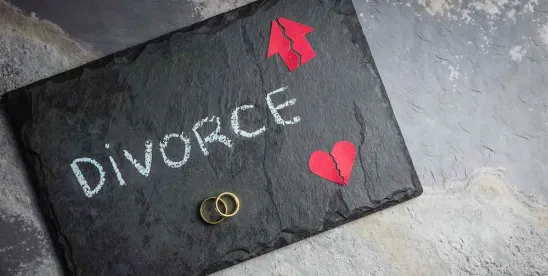Every experience has a story, even the unpleasant ones. The story, or even the entity of marriage and divorce, whether our own or “divorce” at large, evolves with time. A simple fact is that the longer we have been around, the greater the opportunity to take a look and contemplate where we have been and perhaps even glean where the often lamentable (or, in some cases, welcome) phenomenon of divorce is going.
There was once a time when a divorce that occurred on any basis would be considered unthinkable, even unacceptable, throughout any aspect of life, personal or professional. It is fair to say that the many characteristics of marriage, as well as its potential dissolution, have changed since I first began practicing family law. One important factor I have learned over time is that it takes courage to make marriage work, and divorce is no different. We can also find courage in asking what has changed and why.
The Way We Were
In the past, it was the norm for couples to stay married—even if they were unhappy. That’s how things simply were “then.” Compared to modern times, Americans were much more likely to view their marriage and family life through the lens of obligation or personal duty and sacrifice. A successful marriage was often defined by mutual interests, including spousal support and raising children together. This structure was seen as all but universally proper and was expected to span the test of time.
Though respectable and what many would often say was ideal, we must not forget that such a structure was not without its flaws. This unyielding commitment to one’s marriage or family life was held true even in the midst of the most dubious or horrible of circumstances, such as domestic violence, adultery, or the suffering and pain involved with substance abuse. Those factors existed then as much as they do now but were rarely if at all, spoken aloud.
Those who endured pain in their marriages often lacked a way out and were denied the opportunity to seek justice or closure in court. The established expectations all but outweighed one’s emotional health and overall well-being. However, as time marched on, these circumstances and what was perceived as acceptable began to change. Everything evolved.
This Modern Life
The late 1960s were known to be “revolutionary” for a number of reasons. Amongst the many social and cultural changes going on at the time, marriage and divorce also experienced a transformation, and with it was a change in the psychology of how personal growth and individual fulfillment are perceived. In 1969, in my state of California, America was first legally introduced to “no-fault divorce,” a concept that provided married couples the option to divorce one another without blame or fault. To put it more simply, because this law was introduced, couples did not have to prove any specific wrongdoing in court. Divorces could now come about for any number of reasons, even simply by reason of general unhappiness. The legal ramifications of “fault,” still to this day, depend on where one lives in the country. However, this new phenomenon made divorce easier and arguably more common as we know it today.
Compared to times past, the definition or view of what a successful marriage is, or should be, changed and became a more subjective idea in consideration of what a person’s happiness in life is, including their marriage and family. This change in perspective is a welcome one for those suffering abuse within marriage, allowing them a means to move on in life and no longer continue to be trapped in a situation that could cause further unhappiness or damage to their health. Nonetheless, the very notion of divorce became more acceptable and less frowned upon by society, more like we know it to be today.
This new dynamic is far different from the time I was growing up, and it is both good and bad. In the past, we could hardly even speak of divorce, and now it is far more out in the open. To put it mildly, divorce has become a more “normal” event in our lives and our daily court systems. While things have changed, I have always felt that it is really easy to get married, but it takes a great deal of work to get a divorce—perhaps it should be the other way around.
The Future's not Ours to See, and Evolution Remains Natural
If divorce has evolved to be more socially acceptable and even more common than in the past, the question before us is: “Where will things go?” We can’t know, and there is no simple answer—there has never been and never will be. It is all about the situation, yet the economy can also play a significant role. Both now and in the past, it could be financially devastating to get a divorce, and it may not be an option to simply move on. Most of the time, divorce is not simple at all.
Economic climates can and will change as much as social climates. If considering a divorce, retaining a good lawyer who is knowledgeable about the shifting laws will be of the utmost importance, especially when it comes to the division of assets, support, and custody. Will the concept of marriage itself remain attractive? We can’t know for sure. Our children will develop their own ideas and identities as time progresses. How they will see marriage and divorce as they grow older will largely decide where it goes overall. Their history remains unwritten.
Come what may, divorce will always be a part of our lives, and it does not exist without reason. How we handle our family, relationships, and ourselves regarding our own (and our family’s) happiness remains no less relevant. Even with all these considerations and evolutions, I can proudly say that I still very much believe in the institution of marriage. While that may sound odd coming from a divorce lawyer, it is true there are more than a few of us who remain proudly romantic, and that is a good thing.



 />i
/>i

